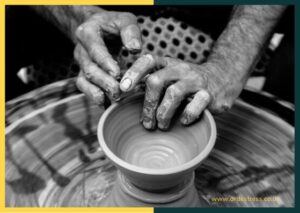 Is more better? Is less more?
Is more better? Is less more?
Doris and David went on a course in clay pottery together. It was a 13 week course and each Wednesday night they took off together. The first night of class, the teacher explained what defined a perfect pot and announced that he was dividing the class into two groups, which had to compete.
One half of the class, which included Doris, would be graded on the quantity of work they produced, and the other half, which included David, would be graded on the quality of their work.
Doris spent a lot time during the 13 weeks in the pottery studio, focussed on creating pot after pot.
David spent a lot time planning and designing different pots on his Mac at home.
At the end of the course the teacher asked Doris’ quantity group to line up their pots: an endless selection of different sizes and shapes filled the room.
Those being graded on quality, however, were asked to produce only one perfect pot. David’s group result was put on a pedestal and heavily admired.
Who do you think was ‘the winner’? The quality or the quantity group?
Surprisingly, all the high quality pots were produced by the group being graded for quantity. It seems that the quantity group had been busy churning out piles of work – and learning from their mistakes. Which meant that each pot was a bit better than the one before.
In the meantime, the quality group had been busy doing research, theorizing about perfection, discussing designs and in the end had little more to show for their efforts than a big file with paperwork and a pot that looked far from perfect.
The lesson about quantity or quality?
It doesn’t always work to focus on the one and only perfect product. It is often more important to develop skills through practicing the production. Endless repetitions which eventually lead to the desired outcome. Focus on the iterations that come before the success. Focus on the hundreds of ceramic pots that come before the masterpiece.
- The process that leads to success: try, fail, learn, repeat.
- Be open minded, take the risk, take the disappointment, learn the lesson and start again with more knowledge and experience.
- Don’t be afraid of making a load of rubbish. be afraid of making nothing at all.
Want to receive these type of ‘Tips from the Coaching Couch’? Sign up to receive my weekly newsletter.
The pottery story is taken from the book Art and Fear (David Bayles)

 Is more better? Is less more?
Is more better? Is less more?